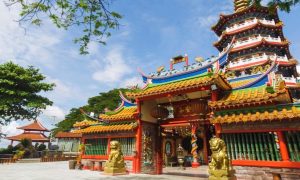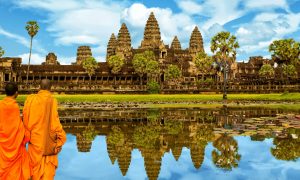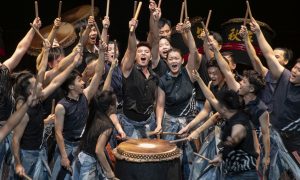On a still and tranquil day for an otherwise gregarious Portuguese ‘village’, there is hardly a whiff nor a stir from the  sandy edge of the sea at Malacca’s Ujong Pasir (loosely translated as ‘Sand’s Edge’) district. The high noon witnesses a few boys cycling determinedly against the drowsiness of the heat, carting groceries home or munchies over to friends’ homes. A lone old man cranks it home on two wheels with a cold sixpack of ‘beber’ (beer).
sandy edge of the sea at Malacca’s Ujong Pasir (loosely translated as ‘Sand’s Edge’) district. The high noon witnesses a few boys cycling determinedly against the drowsiness of the heat, carting groceries home or munchies over to friends’ homes. A lone old man cranks it home on two wheels with a cold sixpack of ‘beber’ (beer).
A motionless woman watches her street from a cane chair under the shade of her verandah. The walls behind her are painted a ‘Virgin Mary blue’ and adorned with crucifixes and framed illustrations of Jesus Christ, the Virgin, the apostles and saints. Pinned behind these frames are the blessed and dried fronds from Palm Sunday, a holy day in the Catholic month of Lent. The roads are identifiably Portuguese with names like Texeira, Sequeira, Eredia and D’Aranjo, in remembrance of the forefathers of yore as well as the priestly founders of the settlement, missionaries from the 1920s/30s Father Avaro Martin Coroado and Father Pierre Francois (a French inclusion to the Portuguese line-up). Further on up the main D’Albuquerque Road, tucked at a corner of the Portuguese Square car park, stands the shrine of St Peter looking out to sea. To his left are the stilted seaside eating houses, cooking up a scrumptious range of local (and halal) Portuguese food such as Chicken Devil Curry and Sambal Belacan-fried vegetables to be washed down by inebriating bottles of Tiger beer. To the right of St Peter’s shrine is Portuguese Square, built in 1985 to the specifications of architects who were sent to studyPortuguese architecture at the behest of
 Prime Minister Datuk Seri Dr Mahathir Mohamad. For this, the Portuguese community of approximately 1,500 appears to be most thankful. Within the square, the Restoran de Lisbon, a feasting place and museum in one, has Mahathir’s visit in the early 1980s documented on its walls along with various historical memorabilia assembled by the restaurant’s owner, George Alcantra, since he was 14 years of age. Alcantra’s published book on The Malacca Malaysian Portuguese Heritage is sold here at RM15, with “proceeds going to the families of fishermen”. It was only in the 1960s and 70s that Portuguese dance in the community was revived. The aforementioned Papa Joe now heads the cultural troupe that showcases its musical, dancing, and singing talents every Saturday evening at 8.30 and during festivals such as the Festa Intrudo (or Water Day, a cleansing activity before the fasting month of Lent) and Festa San Pedro (Saint Peter’s Feast in late June). Such festivities are an uplifting combination of heady fun and revelry, complemented with periods of religious significance.
Prime Minister Datuk Seri Dr Mahathir Mohamad. For this, the Portuguese community of approximately 1,500 appears to be most thankful. Within the square, the Restoran de Lisbon, a feasting place and museum in one, has Mahathir’s visit in the early 1980s documented on its walls along with various historical memorabilia assembled by the restaurant’s owner, George Alcantra, since he was 14 years of age. Alcantra’s published book on The Malacca Malaysian Portuguese Heritage is sold here at RM15, with “proceeds going to the families of fishermen”. It was only in the 1960s and 70s that Portuguese dance in the community was revived. The aforementioned Papa Joe now heads the cultural troupe that showcases its musical, dancing, and singing talents every Saturday evening at 8.30 and during festivals such as the Festa Intrudo (or Water Day, a cleansing activity before the fasting month of Lent) and Festa San Pedro (Saint Peter’s Feast in late June). Such festivities are an uplifting combination of heady fun and revelry, complemented with periods of religious significance.
“The sea is very important to us,” says village headman Peter Gomes. “Ours is more of a water-based religion (judging from our festivals).” On Festa Intrudo, for example, “the community throws water at each other. Anybody who walks into the settlement will get drenched,” says Gomes with a laugh. “During Festa San Juan (St John), the Festival of Lights, lots of candles are lit up at our homes. Mass is performed at the Assumption church 1km from here, and a motorbike motorcade with lit torches will pass light to every house. The residents will light candles in water, rice, salt, and sugar jars to ensure that these things do not run out. One week after that is Festa San Pedro, the Feast of Fishermen for their patron saint,” Gomes continues. Part of the festival involves a procession bearing the statue of St Peter that stops at every decorated boat, which a priest will bless. “This is to ensure a safe passage for fishermen and a good catch.” “Our heritage here has remained since 1511. Our ancestors did not leave things behind (unlike the Babas and Nyonyas of Malacca). The history of our people is in the people themselves.” Unless you get to know them – by the way they speak, and get to know their culture and tradition, they may be mistaken for Malay, says Gomes, “but we differ in terms of our religion.” “We married with their local people, and we have stayed here for 500 years. We do not have Bumiputra status, because of certain political issues. Some of the older generation Malays (Malaccans and Johoreans) resent the Portuguese, because we overthrew their Sultanate.” However, “some of the Eurasians feel we do not needBumiputra status. We do not need to be spoonfed (they say).”
“The economic status of the people is as stable as the other races (within Malaysia),” says Gomes. “We have access to the sea. Our income is supplemented by the sea, the biggest help to the people.” “We are quite economically strong. We have carried out our own projects. We are hoping to carry out some land reclamation for extra parking space during the festivals, and we are hoping to set up a football field. Our people have always been good in sports. We are also running computer classes to ensure that we are not backward with technology.” “Unfortunately, the boys are not faring well with education because they can get income from the sea. The girls fare better,” Gomes notes. “We do not have a problem gaining access to tertiary institutions. We have not exceeded the entry quota to higher education, and we also qualify under the merit system.” “More than 50% of our community are engaged in professional jobs. We have three pilots and a few doctors in this settlement alone, along with sea captains and entrepreneurs. We have lots of musicians, because we are musically-inclined, as well as sportsmen and women.” To keep his community ticking, Gomes affirms: “The religion must be kept intact. Without it, customs and traditions also disappear. The Portuguese were here for 120 years before the Dutch came to persecute them. They escaped to Balik Pulau, and a group of them kept the faith alive. They were known as Imang D’Greja, Apostles of the Church.
 When the British arrived, we returned. We fared well under the British government, and our people could speak English.” In terms of the language, Lazaroo notes that there is a woman from Portugal who teaches “the deeper Portuguese” to the community. However, “the younger ones won’t go. They are not interested,” she says. “Most don’t speak Portuguese when they leave, and some children do not speak it at all because their parents do not speak to them in Portuguese. Only Malacca people speak Portuguese to their children.” “The language has survived (in the community),” says Gomes. We speak to our children in Papia Kristang (the ‘Christian tongue’), which is handed down through speech.” But he concedes that a lot of the younger generation are losing the language when they move away. “The festivals are a good reason for them to come here to recharge their batteries. It is also a good reason to come here and see their relatives,” he adds. “We are a tourism pull, and at the moment, we are getting a lot of government assistance. A lot of tourists come to see the descendants of the Portuguese.”
When the British arrived, we returned. We fared well under the British government, and our people could speak English.” In terms of the language, Lazaroo notes that there is a woman from Portugal who teaches “the deeper Portuguese” to the community. However, “the younger ones won’t go. They are not interested,” she says. “Most don’t speak Portuguese when they leave, and some children do not speak it at all because their parents do not speak to them in Portuguese. Only Malacca people speak Portuguese to their children.” “The language has survived (in the community),” says Gomes. We speak to our children in Papia Kristang (the ‘Christian tongue’), which is handed down through speech.” But he concedes that a lot of the younger generation are losing the language when they move away. “The festivals are a good reason for them to come here to recharge their batteries. It is also a good reason to come here and see their relatives,” he adds. “We are a tourism pull, and at the moment, we are getting a lot of government assistance. A lot of tourists come to see the descendants of the Portuguese.”
These festivities are also brimming with the lively, young blood in the community. Adorned in the latest party gear and many sporting tattoos done by Joshua the resident tattooist who has fled the big city in favour of his community, it is evident by their numbers that the Portuguese culture is being carried forth by the younger generation. The guarding aura of the community never sleeps. The shrine of St Peter may retreat into the shadows at nightfall, but the Saint of the Fisherman is always watchful, while the Virgin’s shrine at Canossa Convent radiates its comforting blue light before a tray of burning wax as the revelry of the community subsides into the dark lapping of waves. Note: This feature is reprinted with the kind permission of Resource magazine and the Malaysian Petroleum Club. It was researched between May and June 2002 and was first published in Resource (Vol 10.3), the corporate magazine of the Malaysian Petroleum Club.
This article has been edited for Expatgomalaysia.com
Get your free subscription and free delivery of The Expat Magazine.
















